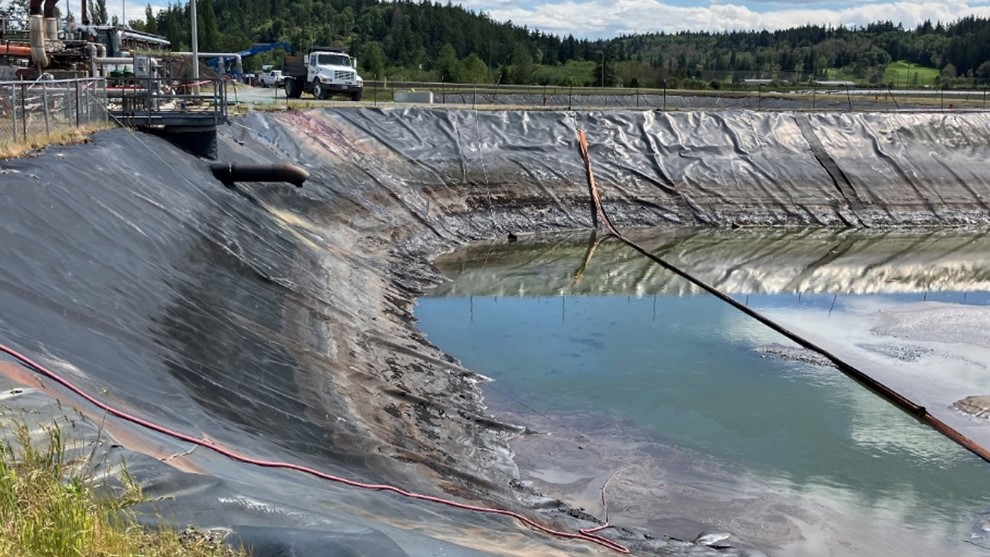Penalties issued for improper storage of dangerous waste at two March Point refineries highlight the need for rigorous industry oversight and underscore the ongoing risks of oil refining along the shores of the Salish Sea.
ANACORTES, WA — This week, the Washington Department of Ecology (Ecology) announced substantial penalties against two oil refineries on March Point in Anacortes for long-term violations of state dangerous waste laws. Despite repeated notifications from state regulators, HF Sinclair and Tesoro Refining & Marketing Co. (now operated by Marathon Petroleum) failed to address serious hazardous waste management issues, putting the surrounding environment—including Fidalgo Bay, Padilla Bay and other areas vital to the broader health of Salish Sea marine life—at elevated risk.
Ecology issued fines of $1,303,000 to HF Sinclair and $1,397,000 to Tesoro, citing violations at each facility’s wastewater treatment system that left toxic waste improperly stored or mismanaged for extended periods. Dangerous waste is defined by Ecology as, “material that is ignitable, corrosive, reactive, and/or toxic, and it can harm human health and the environment if it is not properly managed.”
“We are grateful that Ecology is stepping up to enforce these critical protections, especially at a time when the EPA is rolling back environmental safeguards at the federal level,” said Eddy Ury, Climate and Energy Policy Manager at RE Sources. “But these violations make clear that even with state-level enforcement in place, the risks posed by oil refining in this sensitive region are profound, cumulative, and ongoing.”
Details of the Violations
- Tesoro (Marathon Petroleum): Maintained a 150,000-gallon neutralization pond containing spent sulfuric acid with a pH comparable to battery acid. Ecology inspectors found persistent dangerous acidity in the pond starting in 2022. Despite being ordered to act, the company took nine months to implement safer management. The pond remains a concern as residual waste is still being removed.
- HF Sinclair: In September 2023, oily wastewater overflowed into a containment area not designed to store dangerous waste. The hazardous sludge remained there for nearly a year before being removed, by which time the area’s liner was found to be ripped—raising alarm about possible environmental leakage during the delay.
Both companies have 30 days to appeal the penalties to the Washington Pollution Control Hearings Board.

Why This Matters
The March Point refineries sit just above sea level on a vulnerable coastal peninsula between Fidalgo Bay, Padilla Bay, and the Swinomish Channel, adjacent to Samish Bay’s tribal shellfish beds and critical eelgrass habitat. These shorelines support endangered species, treaty-protected resources, and cultural lifeways. With aging infrastructure—including a 70+ year-old oily water sewer system—and growing climate threats like sea level rise, earthquake risk, and tsunami exposure, the margin for error is shrinking.
“These aren’t just paperwork violations. Dangerous waste leaks could have irreversible consequences for marine life, traditional shellfish harvesting areas, and coastal communities,” said Kirsten McDade, North Sound Waterkeeper with RE Sources. “We have to ask: if it took nearly a year to comply with known orders, what else might still be going unnoticed?”
In addition, a recent tsunami watch for the Washington coast triggered by a major earthquake across the Pacific served as a sobering reminder of the compounding risks posed by seismic events. The waste ponds at March Point appear to be close to sea level and could be easily inundated by sea water.
Next Steps
In light of these serious violations, RE Sources is requesting more information from Ecology about the scope and severity of contamination and remediation, Additionally we’ll be reviewing public records, environmental assessments, and wastewater system maps to identify other potential areas of concern.
RE Sources is also pursuing answers to key questions:
- How likely is contaminated groundwater to reach the Salish Sea?
- Are ongoing pollutant monitoring programs sufficient?
- What more can be done through regulatory updates or public pressure to ensure these refineries are operating safely?
- Did the violations result from a failure to follow process safety management rules (prior to the updates taking effect in 2024) by the facility owners?
- Why did it take so long for each facility to address Ecology’s findings?
Holding Industry Accountable
This news should serve as a wake-up call: Active oversight and strong regulations are necessary, but not always sufficient. The public, tribes, and environmental advocates must remain vigilant. The legacy and ongoing risks of fossil fuel refining—especially in a place as ecologically rich and culturally significant as the Salish Sea—demand transparency, long-term planning, and ultimately a shift away from the dirtiest parts of our energy system.
###
About RE Sources
RE Sources is a nonprofit environmental advocacy organization working to protect the lands, waters, climate and communities of northwest Washington. To learn more, visit re-sources.org.
Contacts:
Kirsten McDade, North Sound Waterkeeper at RE Sources, KirstenM@re-sources.org, 360-220-0556
Eddy Ury, Climate and Energy Policy Manager, RE Sources, EddyU@re-sources.org
Stay Engaged
Sign up for our monthly E News, The Barnacle, so you can stay up to date as we learn more and advocate for better, safer operations and management at our region’s oil refineries.
